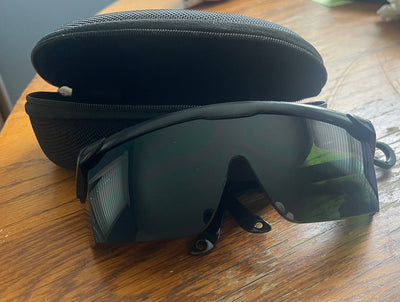Troy Brandenburg: Healing horses
Growing up in Australia, it was almost inevitable that Troy Brandenburg would be a horseman. He grew up in a horse family and continued its family.
“My father was a horseman,” Troy recounted. “He was jockey and a horse trainer on a Saturday and on a Sunday he would go to rodeo, and he was successful at both. From a young age growing up on our property in Queensland I learned to ride horses. At 14 I was at the racetrack riding my father’s horses at trackwork.”
He rode his first race as a jockey when he was 14. He won, launching a successful riding career. It spanned continents and saw him atop more than 1,600 winning horses, as well as bringing home hardware from the rodeo circuit.
“Horses are all I know,” he said. “They’re what I’m comfortable with.”
Thumbelina
But as wear and tear on his body necessitated the end of Troy’s racing and rodeo career, it would be a 17.5-inch charmer who would help launch the next phase of his Troy’s – as an equine sports therapist. Her name was Thumbelina.
“I think that’s when I first started getting into the rehab side of things and believing a little more in what we could do if we try,” he remembered.
The Guinness Book of World Records recognized Thumbelina as the world’s smallest horse in 2002 – a distinction she holds today. A mini horse by breeding, she was born with dwarfism at Goose Creek Farms in Ladue, Mo. She stood a mere six inches tall at birth and tops off at a height of 17.5 inches.
“Thumbelina, like many minis, had a degenerative leg, so her leg was off to the side,” Troy recounted. “She was walking on the side of her foot to the point it was just wearing her down. I wasn’t sure what to do at the time. She definitely had some issues by the way she was walking.”
Therefore, Troy relied on what he knows about horses and their anatomy.
Helping Thumbelina
“I went with the thought that muscles and soft tissues control the skeletal system,” he said. “I believe those soft tissues, the tendons and muscles, are the pulleys and levers that control the skeleton. Unless you release the soft tissue that’s pulling the bone out of place it will come out again.”
Curing these types of soft tissue injury, Troy wholeheartedly believes, is all about muscle memory.
“I was able to break up the adhesions and scar tissue, to soften them up and release them,” Troy said. “By doing that I was able to get her standing up straighter. That leg wasn’t strong enough to hold her like that so I got some PVC and made her a brace to support the leg to start with. Once her owners saw what I was doing they located someone to make a professional brace for her.
“I was able not to change the structure of the bone – the bone was intact; it was the muscle that was pulling everything out of place. Whenever anyone has an injury they have to go to rehab. You can repair a muscle but you have to give it new memory.”
In three hours both Thumbelina’s and Troy’s lives were changed.
A life dedicated to horses
“Thumbelina got me open to thinking outside the box and understanding more about how the soft tissues control the skeletal system,” he said.
“My love is doing equine sports therapy. It’s like a physical therapist for any athletic team,” Troy explained. “We understand the workings of the body and how one muscle or one tendon can influence so much of the rest of the body. I’ve kept my approach simple and I love making a difference.
Troy also operates Brandenburg Equine Therapy, a website on which he sells products he uses in his work with horses.
What every horse owner should know
Troy travels the world helping horses and their owners cope with and fix problems.
I’m continually buying and trying things but at this point I haven’t found something better that what I’ve got but I am always open to finding something better, he said.
“People bring me horses and I’m able to find some simple problem and I show what the (owner) can do. Anyone can release a muscle or a tendon, but it’s what they do when I leave,” Troy explained. “If people just understood, they could do so much themselves to help their horses.
“I also understand that the horse and rider are a team. And it’s not always the horse’s fault”
Likewise, there are a few simple truths about horses that Troy wishes every horse owner knew.
“I wish people would understand how much a horse tries for their person,” he said. “I further wish people would understand that horses are not a tool and they shouldn’t be treated as such. And I also wish people would learn to understand how much they can help a horse themselves.”
Above all, Troy has one piece of advice that every horse – and pet – owner should take to heart.
“Listen to your animal. They are trying to tell you what they need.”
To contact Troy Brandenburg, visit BrandenburgEquineTherapy.com.
To visit Brandenburg Equine Therapy’s online store, click here.






